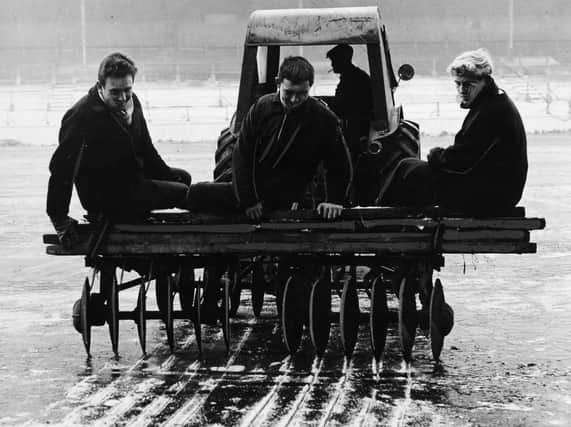Bizarre FA decision, Elland Road's barnyard pitch and Stanley Matthews refusing to play - Leeds United's last lengthy suspension


In the club's 100-year history, the only interruptions we have had to the season (WWII aside) have been the unpredictable nature of the weather and, in modern times, international breaks.
Back in 1962, the coldest winter for 200 years was about to hit the country and on December 22 many fixtures were postponed, but Leeds’ game, away at Sunderland, went ahead despite the fog.
Advertisement
Hide AdAdvertisement
Hide AdUnited left a frozen Roker Park with a 2-1 defeat. A Billy Bremner goal, from 25 yards out, on the hour had levelled matters after George Mulhall opened the scoring for the hosts but eight minutes later, Charlie Hurley grabbed a winner.
Leeds’ next game was Boxing Day at Scunthorpe United and the Iron were due at Elland Road for the return fixture two days later.
Neither game went ahead as snow and ice covered the country.
Out of the 46 scheduled Boxing Day games, 19 were postponed and three were abandoned.
Advertisement
Hide AdAdvertisement
Hide AdAt Mansfield Town, referee Jack Pickles needed a police escort to avoid angry fans, as he took the players off in their game against Bradford City, with the scores at 1-1.
The first Saturday in January 1963, Leeds were due to play Stoke City at Elland Road in the Third Round of the FA Cup.
On the Thursday before the game, the ground staff cleared snow from the pitch and despite it being hard in places, the club were hopeful.
The following day, 24 of the ties had already been called off.
Advertisement
Hide AdAdvertisement
Hide AdLeeds remained confident the game would go ahead but after an 8:30 pitch inspection on the morning of the game, referee Ken Seddon declared the surface unplayable.
Between December 22 1962 and January 5 1963, 121 out of 180 games, up and down the country, had been postponed.
Bizarrely, the FA continued with the Fourth Round draw and Leeds or Stoke City were drawn away at Blackburn Rovers or Middlesbrough.
The weather got worse to the extent that temperatures fell below minus 20 and the sea water in many UK harbours was frozen. Roads were blocked, telephone lines were brought down and many areas were cut off. Farmers could not get to their cattle and animals froze to death.
Advertisement
Hide AdAdvertisement
Hide AdLeeds did not return to action until March 2 against Derby County, 70 days since the defeat by Sunderland.
The Elland Road surface resembled a barnyard, covered in mud and straw but the conditions did not prevent Leeds running out 3-1 winners, thanks to goals by Don Weston, Jim Storrie and Jack Charlton.
The Third Round tie against Stoke was eventually played four days later, after 12 postponements, in conditions that Stoke’s legendary Stanley Matthews refused to play in.
Leeds won 3-1 in the club’s first FA Cup victory for 11 years. Grenville Hair, who scored the third goal, was the only player who had featured the 2-0 1952 cup win against Bradford City.
Advertisement
Hide AdAdvertisement
Hide AdAs a result of the abysmal winter, the season finished on May 18 with Leeds playing an incredible nine games during the month of April.
Marc Bracha is a published author and runs Leeds United nostalgia treasure trove https://www.sheridan-dictates.com/
Comment Guidelines
National World encourages reader discussion on our stories. User feedback, insights and back-and-forth exchanges add a rich layer of context to reporting. Please review our Community Guidelines before commenting.